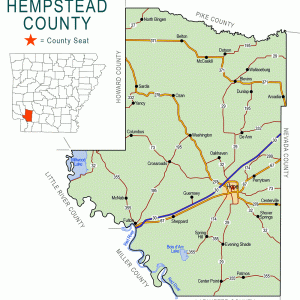calsfoundation@cals.org
Columbus (Hempstead County)
Columbus is an unincorporated community in Hempstead County, on State Highway 73. Along with Washington (Hempstead County) and Fulton (Hempstead County), Columbus is one of the oldest communities in the area and was once a major commercial center.
Native Americans lived in the area for centuries before the first white settlers arrived. Caddo were the principal residents of the area when it was purchased from France by the U.S. government in the Louisiana Purchase in 1803. Five years later, Abner and Reuben Mouren traveled north from Mooringsport, Louisiana, and built a grist mill and a blacksmith shop out of logs near a natural spring. They were soon joined by several other families. The settlement was known as Pin Hook until 1830. James Walker, a doctor from New York, arrived and set up practice, as well as organizing a Masonic lodge. Ephraim Myrick and William Moss opened the first store in Columbus, selling products ranging from silk dresses to whiskey. A post office was established in 1834. Historians assume that the community and post office were named for explorer Christopher Columbus. The settlement is said to have had academies for both boys and girls, but their history is unknown.
No tavern or hotel was built in Columbus before the Civil War, but Walker frequently hosted visitors in his home, an eighteen-room mansion with seven outbuildings including a kitchen, a store house, and a dairy. Wealthy owners of nearby plantations visited the community. Printer Sam Williams wrote that the men of Columbus “were noted for their wealth, culture, and hospitality; the women for their refinement, wit, and beauty; both sexes for their high social qualities, their love of neighborly intercourse, and the observances of those little courtesies and amenities that contribute so much to render the journey through life agreeable and pleasant.”
Many slaves toiled on the plantations. When the Civil War and the Thirteenth Amendment to the U.S. Constitution ended the practice of slavery, some African Americans left the area, but many remained as tenant farmers, continuing to work the same land.
The community appears to have incorporated as a town sometime after the Civil War, as census populations are listed for 1880 and 1890. A Presbyterian church was organized in 1875. A Baptist church was later founded. By 1890, Columbus had five general stores, a grist mill, a cotton gin, a hotel, a blacksmith shop, and a schoolhouse, as well as the post office and churches. In 1912, Columbus had a branch of the Hempstead County bank, a physician, a wagonmaker, three general stores, two grocers, two cotton gins, a grist mill, and a population around 200.
Highway 73 was part of the original state highway system designed in 1926. As roads were improved in southern Arkansas, businesses began to abandon small communities like Columbus to relocate to larger cities such as Hope (Hempstead County). The school district was consolidated into the Hope School District in the 1940s. The last stores in Columbus closed in the 1960s.
Also in the 1960s, a dam was built across the Little River several miles west of Columbus, creating Millwood Lake. The lake was built to control flooding on the Red River, but it also provides drinking water for several communities and draws tourists who come for fishing, birdwatching, boating, hiking, and camping. A state park is on the south shore of the lake.
In 1997, the Arkansas Game and Fish Commission purchased nearly 5,000 acres of land near Columbus, some of which had been a private hunting preserve and some a cattle farm. On this land, the commission established the Rick Evans Grandview Prairie Conservation Education Center. This center conserves a prairie environment with many kinds of wildlife. It comprises open prairie, woodlands, savanna, and non-native grasslands, and it also has watering holes, two of which are stocked with fish and used for fishing tournaments.
Columbus is also home to the Old Columbus Herb Farm, with a garden center and a gift shop, open to the public Tuesday through Saturday.
For additional information:
Jones, Mollie Cannon. “Century-Old Columbus: Hempstead County Town Is Celebrating the One-Hundredth Anniversary of Its Founding.” Arkansas Gazette Magazine, February 11, 1934, p. 5.
Montgomery, Donald Ray. “Simon T. Sanders, Public Servant.” Arkansas Historical Quarterly 39 (1980): 159–168.
Steven Teske
Butler Center for Arkansas Studies
 Columbus Post Office
Columbus Post Office  Hempstead County Map
Hempstead County Map 



My grandfather had the post office and general store. It was closed in the mid-1970s. We donated his post office to Old Washington and the store property to the Columbus fire department. His name was Benjamin David Mitchell Jr.